Originally published on Nintendo Castle.
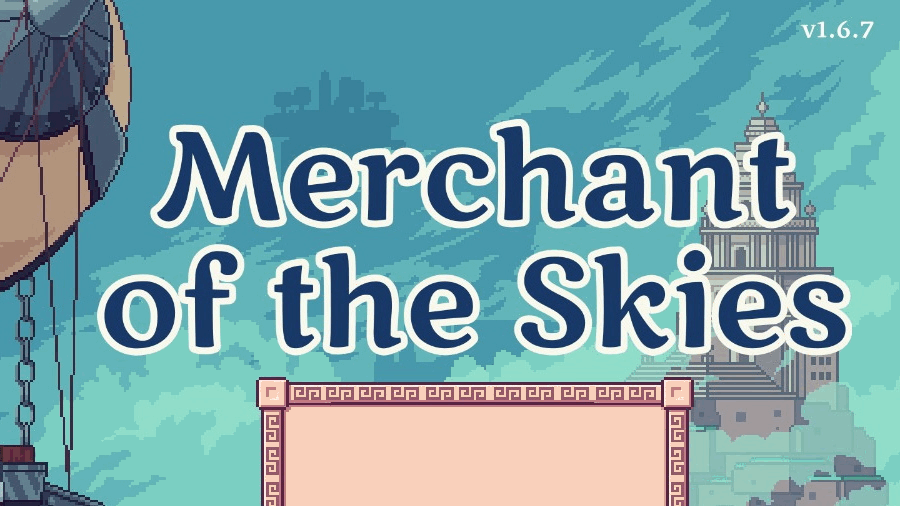
Merchant games have a long history, from the earliest days of gaming people have been interested in comparing prices and using that to turn a profit in a variety of settings. Merchant of the Skies is a perfect example of this genre being taken to its logical conclusion, and not by adding features, but by simplifying. It's time to find out if that strategy is worth pursuing!
Platforms: Steam, Switch, Xbox One
Developer: Coldwild Games
Release: July 30, 2019
MSRP: $14.99
Gameplay in Merchant of the Skies is varied, but at a base level, you move by, essentially, clicking where you want to go on a world map. You uncover this map over time by piloting your airship to new areas that are gradually revealed from objectives. When you click where you want to go, you then move in a straight line towards that floating island, burning fuel along the way to power your ship. Fuel costs money, and that drives your progress forward. This game is based on profit, as any good merchant game should be, so your goals are usually to get more money.
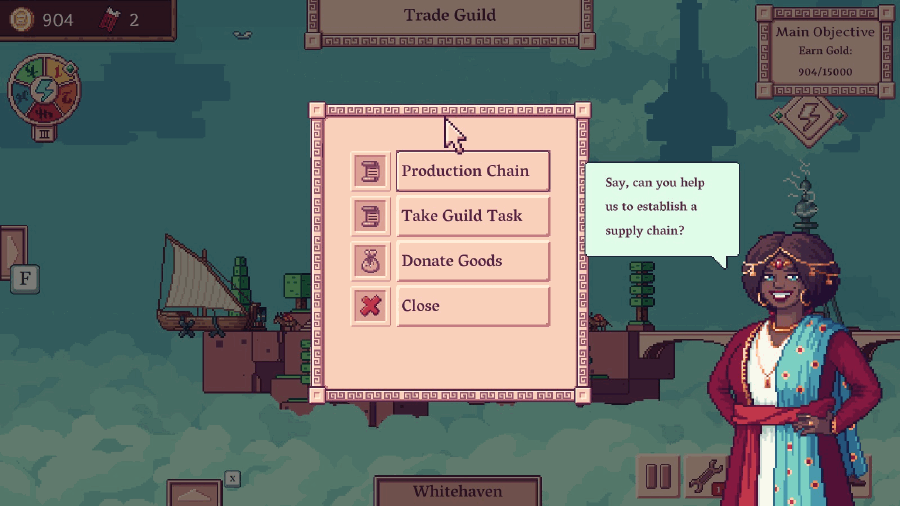
Trading is the best way to get money. To simplify it, you check prices that you get from the places you've visited. By getting this information, you can then buy low in one place and sell high in another to turn a profit. This is less satisfying than it should be since essentially you are moving goods across a barren sky with very little to offer.
This is where the game begins to fall apart, since there's no combat there's no risk for making long trips other than losing a small amount of money from fueling up along the way. Without getting into early economics and their videogame counterparts, economies in most games require 2 related things: risk and loss. Players should have to take risks to move goods, acquire goods, and then get a payout. Loss supports risk since losing your goods feels bad but motivates you to either do the same to others or buy safer. Capitalism is high-risk high reward, and this is especially true in videogames.
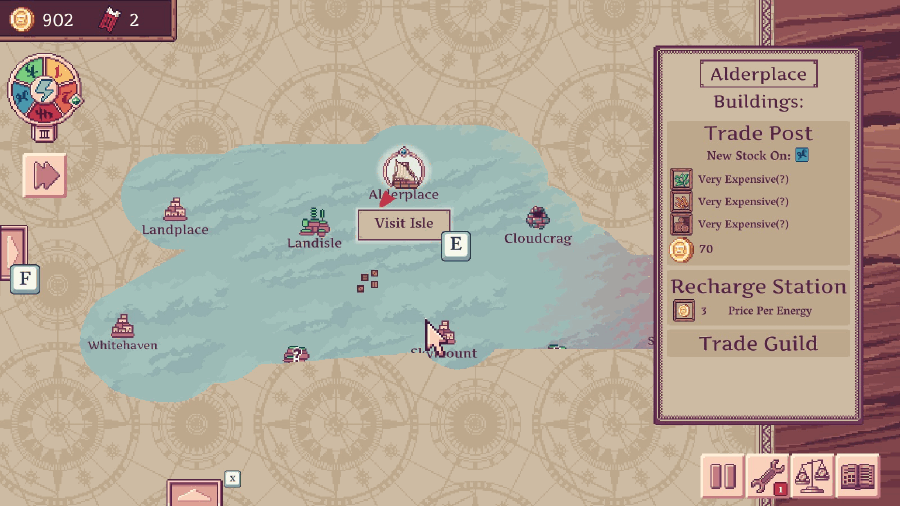
While all of this is true, at least partially, for most games, it doesn't have to be this way. Some games decide to use time as a way to augment risk. Other games make travel take an abysmally long amount of time to move across the map, but importantly they give you things to do on the way that support normal gameplay. So, it feels bad to waste time (risk), but at least it wasn't a total waste. Game design-wise, Merchant of the Skies, fails to provide adequate risk for moving goods across the map. It's almost guaranteed that you will succeed, and while this feels good at first, it feels terrible to realize that your hard work was spent on a game where you cannot fail, you just succeed slower.
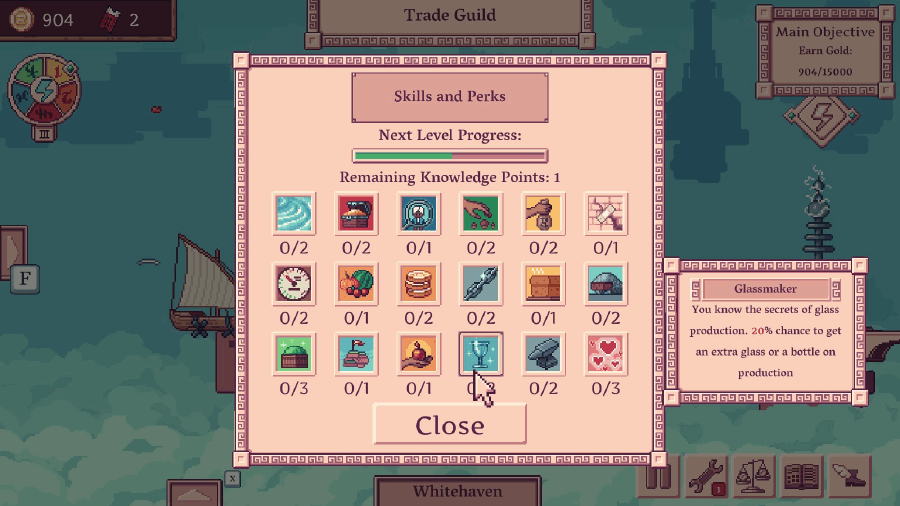
Some people might find satisfaction in this sort of "chill" game, but Merchant of the Skies actually requires a significant amount of focus to make the right decisions to optimize gameplay, which makes it not quite fit the niche of a game that you can play while attempting to relax.
This feels strange to say, but it almost seems that travel doesn't take long enough. I would've loved to see travel take a long amount of time, with little mini-games and other such resource gathering time-wasters to make the experience more enjoyable. This would make the journeys both fun and rewarding, even if you only make back what you spent on the materials you were transporting.

In addition to this, Merchant of the Skies only has 2-3 major mechanics. There's trading, which we've already discussed, but there's also quests and base-building. Quests seem hollow and uninteresting, and it doesn't take long before you repeat them, but this is also a fairly small portion of the game, especially in sandbox mode. Base-building is likely the most interesting part of this game since it serves to provide you with passive income and a goal to work towards. Even then, it's much better to play games that provide you with a permanent base to sell materials, upgrade, and otherwise personalize.
Presentation is lacking, since islands all basically look the same, have the same theme, and are very uninteresting. The giant carrots and flying turtles are nice additions but don't make up for the monotonous, mind-numbing, environments, or the same music that plays without fail every time you get to an island. The pixel art is also very simple, but this is a stylistic choice that doesn't negatively or positively affect the gameplay as a whole.
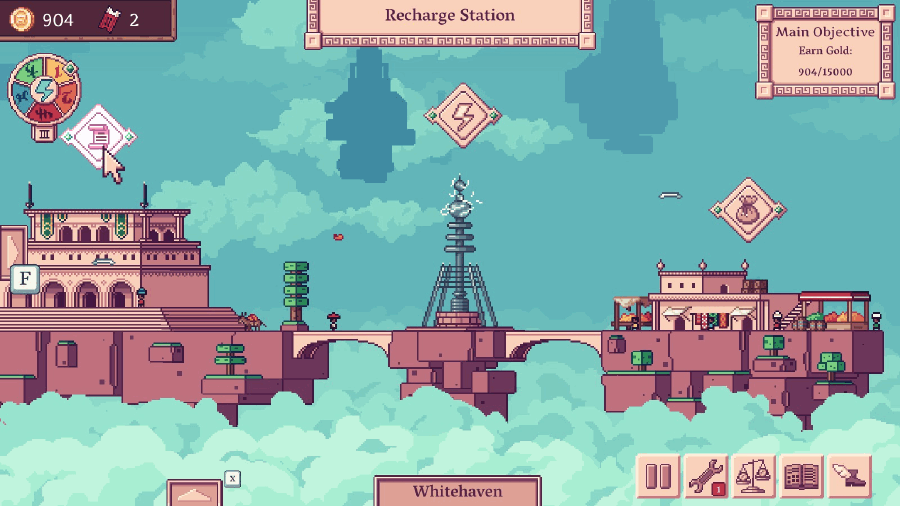
Merchant of the Skies does succeed in a few ways. For one, it has a charming overall aesthetic. The economy and trading are actually fairly fun to try to abuse. Also, there are a lot of clever ideas and cute art in the game. However, fundamentally, this is a game that you have fun trying to break, not a game that is genuinely fun to play, but that is still fun to be had. That being said, unless economy games are your specialty, Merchant of the Skies is a fundamentally disappointing experience.
Pros:
- Story is interesting
- Charming aesthetic
- Art is pleasant to look at
- Maximizing profits is both satisfying and fun
Cons:
- Lack of a compelling economy
- Travel is uninteresting
- New ships and island upgrades are expensive and grindy to obtain
- Lack of danger or risk
- Monotonous music
- Disappointing campaign
Verdict:

Mediocre
These games are generally unmemorable. For the average gamer, they probably aren't worth your time or money. Significant flaws in gameplay or a serious lack of content make these games inferior. These games usually have some redeeming qualities and may be enjoyed by a niche audience, but don't get a recommendation from us.
Want to know what this score means? Check out our Scoring Guidelines page.